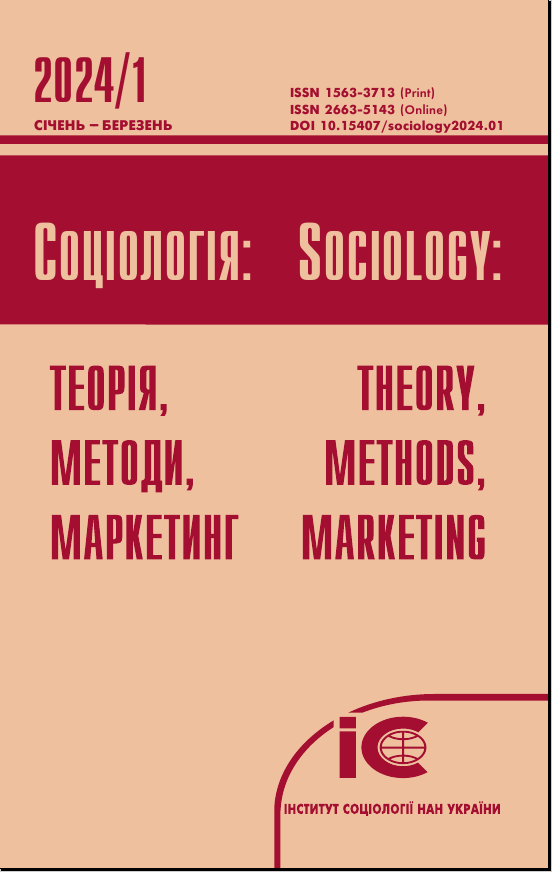Sociological metatheorising in the 1980s and 1990s: Philosophical aspects of some alternatives to the positivist specification
stmm. 2019 (2): 121-142
UDC 316.2
DOI https://doi.org/10.15407/sociology2019.02.121
Valerii Pylypenko - Doctor of Science in Sociology, Professor / Leading Research Fellow (Department of History and Theory of Sociology), Institute of Sociology of National Academy of Sciences of Ukraine,Kyiv
ORCID https://orcid.org/0000-0002-9918-6217
Keywords: theorising, metatheorising, theory, metatheory, metasociology
References
Bourdieu, P., Wacquant, L. (2015). An invitation to reflexive sociology. Part II: The Chicago workshop. [In Ukrainian]. Kyiv, Ukraine: Meduza Press. [=Бурдьє 2015]
Fay, B. (1985). Theory and metatheory in social science — or, why the philosophy of social science is so hard. Metaphilosophy, 16(2–3), 150–165. https://doi.org/10.1111/j.1467-9973.1985.tb00161.x .
Fuchs, S. (1991). Metatheory as cognitive style. Sociological Perspectives, 34(3), 287–301. https://doi.org/10.2307/1389512 .
Fuchs, S. (1992). Metatheory and the sociology of sociology. Sociological Perspectives, 35(3), 531–535. https://doi.org/10.2307/1389334 .
Fuhrman, E., & Snizek, W. (1990). Neither proscience nor antiscience: Metasociology as dialogue. Sociological Forum, 5(1), 17–36. https://doi.org/10.1007/BF01115135 .
Merton, R. K. (1968). The Matthew effect in science. Science, 159 (3810), 56–63. https://doi.org/10.1126/science.159.3810.56 .
Pylypenko, V. (2017). Metatheorising in sociology: Particularities, types and trends. [In Ukrainian]. Sociology: Theory, Methods, Marketing, 2, 59–76. [=Пилипенко 2017]
Reznik, V. (2017). J. H. Turner’s positivist (meta)theorising: Underpinnings and outlines for strategy. [In Ukrainian]. Sociology: Theory, Methods, Marketing, 4, 68–93. [=Резнік 2017]
Turner, J. H. (1990). The misuse and use of metatheory. Sociological Forum, 5(1), 37–53. https://doi.org/10.1007/BF01115136 .
Sociological metatheorising in the 1980s and 1990s: Philosophical aspects of some alternatives to the positivist specification
stmm. 2019 (2): 121-142
UDC 316.2
DOI https://doi.org/10.15407/sociology2019.02.121
Valerii Pylypenko - Doctor of Science in Sociology, Professor / Leading Research Fellow (Department of History and Theory of Sociology), Institute of Sociology of National Academy of Sciences of Ukraine,Kyiv
ORCID https://orcid.org/0000-0002-9918-6217
Keywords: theorising, metatheorising, theory, metatheory, metasociology
References
Bourdieu, P., Wacquant, L. (2015). An invitation to reflexive sociology. Part II: The Chicago workshop. [In Ukrainian]. Kyiv, Ukraine: Meduza Press. [=Бурдьє 2015]
Fay, B. (1985). Theory and metatheory in social science — or, why the philosophy of social science is so hard. Metaphilosophy, 16(2–3), 150–165. https://doi.org/10.1111/j.1467-9973.1985.tb00161.x .
Fuchs, S. (1991). Metatheory as cognitive style. Sociological Perspectives, 34(3), 287–301. https://doi.org/10.2307/1389512 .
Fuchs, S. (1992). Metatheory and the sociology of sociology. Sociological Perspectives, 35(3), 531–535. https://doi.org/10.2307/1389334 .
Fuhrman, E., & Snizek, W. (1990). Neither proscience nor antiscience: Metasociology as dialogue. Sociological Forum, 5(1), 17–36. https://doi.org/10.1007/BF01115135 .
Merton, R. K. (1968). The Matthew effect in science. Science, 159 (3810), 56–63. https://doi.org/10.1126/science.159.3810.56 .
Pylypenko, V. (2017). Metatheorising in sociology: Particularities, types and trends. [In Ukrainian]. Sociology: Theory, Methods, Marketing, 2, 59–76. [=Пилипенко 2017]
Reznik, V. (2017). J. H. Turner’s positivist (meta)theorising: Underpinnings and outlines for strategy. [In Ukrainian]. Sociology: Theory, Methods, Marketing, 4, 68–93. [=Резнік 2017]
Turner, J. H. (1990). The misuse and use of metatheory. Sociological Forum, 5(1), 37–53. https://doi.org/10.1007/BF01115136 .
